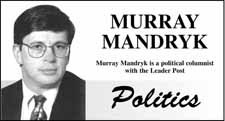Whether one realizes it or not, the complex nature of most political issues tends to test one's political views.
In fact, a few issues hitting rural Saskatchewan this summer have quietly tested the foundation of one's beliefs - particularly for the many in rural areas that have come to view themselves as right-wing and conservative-minded.
For most of the last three decades, we've witnessed a transformation of many rural Saskatchewan people into what could roundly be described as entrepreneurial, independent conservative thinkers.
What was once known as the Liberal "L" in Saskatchewan - the ridings along the U.S. and Alberta borders that always voted against CCF-NDP NDP governments - rapidly turned into all of rural Saskatchewan in the Grant Devine sweep of 1982. And with the exception of the 1991 Roy Romanow's sweep that was mostly a backlash against a decade of fiscal mismanagement by the Devine Tories, this conversion to conservatism seemed a permanent one. Even the remnants of what was once known as "Red Square" _ the rural seats surrounding Yorkton that traditionally voted CCF-NDP - became staunchly conservative.
This transformation can be directly tied to bigger farmers who feel less reliant on cooperatives, the Wheat Pool and the Canadian Wheat Board and rural economy Saskatchewan more tied to natural resources like oil, gas and potash and on implement manufacturing. And what really seemed to fortified rural Saskatchewan as right-wing and conservative-minded was its massive, record support of now Premier Brad Wall's Saskatchewan Party in the 2007 election.
Yet what's been lost on many - particularly many Conservative and Sask. Party strategists who desperately want this transformation is permanent - is very few people are so rigid in their beliefs that they don't see the benefit in someone else's philosophy approach every now and then. There has been a reawakening in rural Saskatchewan this summer that government serves a role, that the services it provides are important and that unfettered capitalism isn't always the best thing for us.
Consider the reaction in rural Saskatchewan to everything from the closures of SaskPower offices to the cutbacks at nursing home beds and hours of operation of health centres.
However, the story that's been the biggest eye-opener to rural people than those who have had to deal with the impact of flooding who have re-discovered the need for strong government support programs - be it for flooded and unseeded acres or uninsured flooded basements.
Of course, many would argue that such government service and support is less philosophical than it is the practical spending of tax dollars. But, at least some level, it reminds us of the need for government involvement.
And as we found out on another big recent story of this summer, even the most right-wing politicians are having their unfettered beliefs in the free-market system called into question - or so seems the case in the wake of foreign mining giant BHP Billiton attempts to take over the PotashCorp.
One person questioning this deal is our very capitalist-oriented Saskatchewan Premier Brad Wall, who announced his government would hire independent analysts to examine whether the Australian mining giant's takeover would be good for Saskatchewan people who own the potash resource. It seems that BHP's eagerness to pull out of the Canpotex - the collective Canadian marketing arm for potash - has government worried that BHP would undercut competitors prices. That would clearly not be in Saskatchewan taxpayers' interests. Even Grant Devine is saying the province needs stone-clad guarantees from BHP to insure taxpayers interests are protected.
Normally, right-wing politicians aren't inclined to support such interventionist measures.
But like a whole lot of other issues this summer, it's an issue testing people's philosophical resolve.Murray Mandryk has been covering provincial politics for over 15 years.




